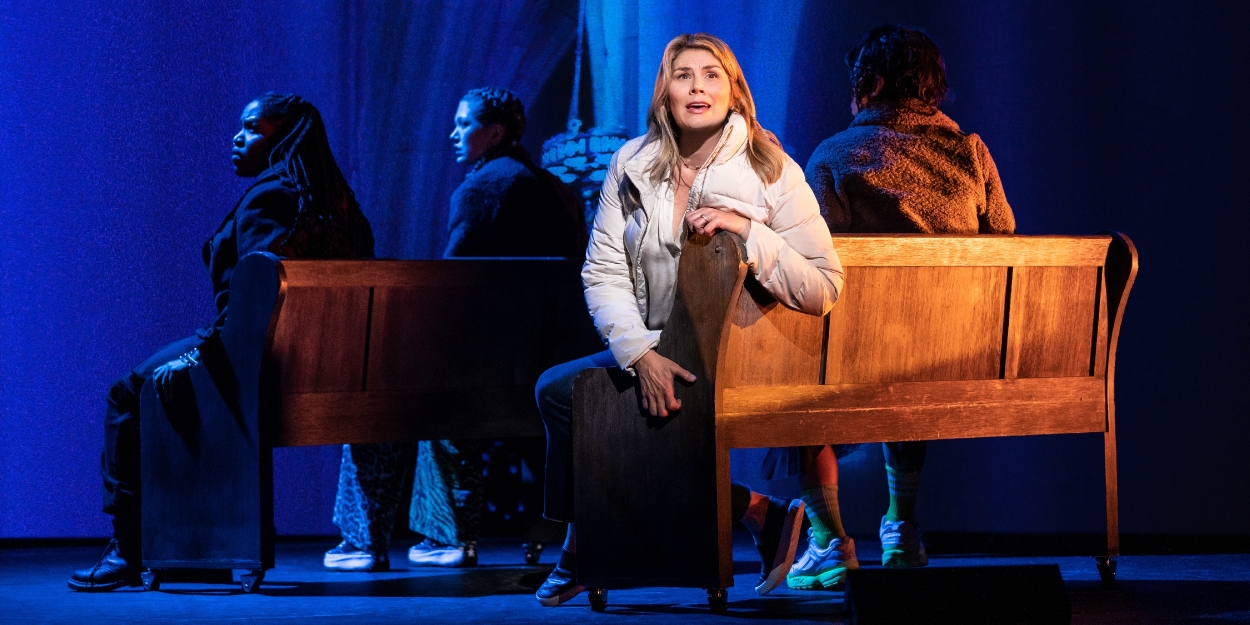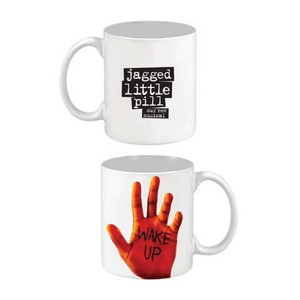Interview: Heidi Blickenstaff on Why JAGGED LITTLE PILL Feels 'So Personal'
Heidi Blickenstaff speaks about why the role of Mary Jane Healy feels so personal and how it's the biggest challenge of her career.

Broadway staple Heidi Blickenstaff first played the leading role of Mary Jane Healy in Jagged Little Pill when the musical reopened on Broadway after the height of COVID-19 pandemic. Now, Blickenstaff's back in Mary Jane's shoes for the national tour, once again playing the opioid-addicted, suburban Connecticut mother trying to hold it all together while expressing all of her emotions through Alanis Morrisette's songs. I interviewed Blickenstaff about why the role feels so personal, how it's the biggest challenge of her career, and what it's like to rock out to Alanis's iconic song catalog on stage.
JAGGED LITTLE PILL was the first musical you performed on Broadway following the pandemic. Can you tell me about what it was like to return to Broadway?
It was surreal because after living through those really difficult months of the pandemic I think so many of us in the theater community were wondering if we were ever going to work again. And it wasn't just the pandemic, but it was also all of the upheaval surrounding George Floyd. There was a reckoning happening in the Broadway community.
I think, along with many of my colleagues, I felt like maybe it's over for me, and I'm gonna have to figure out what to do next. My husband and I were exploring all kinds of different dreams to chase. And the opportunity to reopen JAGGED came up, and it was more than I could have imagined. I mean, not only was I taking on this extraordinary role which in so many ways has parallels to my own life and it feels so personal to me, but I was also linking arms with my good friend Elizabeth Stanley.
[She] was at the time still pregnant, and we hatched this plan to share this role in an unprecedented move to support Broadway mothers. So I was getting to do this extraordinary artistic challenge, but I also was setting a precedent honestly with my friend. We've now become a model in the Broadway community for women who need to take time off to have their baby but want to come back and want to come back in a different capacity. Now there's the Heidi/Elizabeth model that a lot of mothers are looking at and saying I want that.
That was something that remains to be one of my most proud moments in my career. But then to actually get to do the role and reopen on Broadway in the biggest role I've ever played was crazy because I hadn't been back on Broadway since SOMETHING ROTTEN. I think it had been like six years. To be back in this capacity doing this show at that specific time was a privilege, and it stretched me in ways that I could never even have imagined. And it was such a blessing.
Now you're obviously playing the part again on tour. How did you prepare to step back into Mary Jane's shoes, so to speak?
I think when they asked me to do the tour it was an easy yes for me because the
.jpg)
Broadway run got cut so very short because of Omicron. I think all told my Broadway experience was only like three months or less. It was very brief. Like I said before, this role feels incredibly personal for me. It really does cater to all of my strengths. I wasn't done with her. When they asked me to go on tour, I said yes very quickly. We were also spending a lot of time on the West Coast with the tour. I'm from California and because of COVID, my entire California family wasn't able to see me on Broadway. Doing the show on the West Coast for them was particularly sweet just to be able to share this story with them and come home. I got to spend so much time with my family over the holidays and that hasn't happened in years. It was a bonus of the tour.
The role of MJ feels very personal to you. Can you tell me more about that?
I've said this before publicly, but I am a survivor of sexual abuse. My story is different from Mary Jane's story, but I resonate with her pain a lot because it was something I buried a lot, as does Mary Jane. I've recently become more public about what happened to me. Playing Mary Jane every night was a main line in healing for me. And it not only has been healing for myself, but so many other people that have sustained a similar situation have felt very seen by Mary Jane's storyline.
But also the addiction piece is something that I lived through as a family member. Watching one of my immediate family members go through his addiction and just the decades of everything we went through. He's now on the other side of it and has been in recovery for eight years and is doing so beautifully well. But there were many years when we as a family didn't know if he was going to live to die.
To be able to tell that part of Mary Jane's story felt also very personal to me because I lived it so deeply as a family member of a person who's an addict. There are moments in JAGGED that are direct quotes from my own life, both with the sexual abuse [storyline] and the addiction. To be able to do this show night after night, my soul has needed to be able to express in this way. That's one of the great things about art is that it helps the artist, but it also helps so many other people. It's been really beautiful to share that with people along the way.
%20Heidi%20Blickenstaff%2C%20Allison%20Sheppard%20and%20Jena%20VanElslander%20in%20the%20North%20American%20Tour%20of%20JAGGED%20LITTLE%20PILL_%20Photo%20by%20Matthew%20Murphy%20for%20MurphyMade%2C%202022.jpg)
castmates Allison Shepard (Middle)
and Jena VanElslander (R)
How did you approach Alanis's songs? Did you think about them only in the context of your character, the narrative she wrote in each song, or is it a combination of both?
I think it's definitely both. Alanis is so magical. Even at 19 , when she and Glen Ballard were writing this album, she had a pathway into herself and the pathos of what she was going through in a way that I had never heard before when I listened to that album. I was always a fan of female rockers for sure, but I had never identified with any [album] like I identified with JAGGED. I would go on to be an Alanis fan with all of her subsequent music.
What's so crazy about this album and this story is that the magic feels organic to the story we're telling. There's no part of it that feels pasted together or just like, "Here's a good place for a hit." It all feels incredibly true to the story. That's a testament to our creative team...so it's not hard for me to always be in Mary Jane's feet. Though what she's saying is from an album that preceded her, it's very organic to what Mary Jane is going through.
Then there's the other piece, which is the super fun part. Even though I'm playing a character who is in so much pain, there's that rockstar Alanis part. You want to give the people what they want, and they want Alanis. They want to hear the music they all were rocking out in their cars to. That's another amazing thing I think our show does. I think people might come in skeptical and think they'll be disappointed hearing Alanis's songs. Not only are they not disappointed, but because there's a huge story supporting these songs, they're only elevated. I've only heard people come out saying, "Oh, I didn't know I was going to love it so much and I didn't know it was gonna rock so hard." I'm so proud we're able to give people this amazing experience without disappointing their Alanis expectations.
In particular, when I'm singing "Forgiven," that is a moment where I'm always in Mary Jane's feet, but I'm also definitely leaning into my inner Alanis. The song that I listened to so many times, and I want to make people happy. I'm not doing an Alanis impression. That would be ridiculous. It is fun to think about how big that song is in a rock context. I try to lean into that.
When making your vocal choices for this role, how did you determine how much of your classic musical theater background to incorporate, and when to take inspiration from Alanis's unique vocal inflections, modulations, style and tone? She has such a unique tone.
That's a good question because I just kind of do what I do. A lot of the show I have to lean on my training because it's so epically difficult and to do it as many times a week as we're doing it, you can't sustain screaming like that. Alanis, I've now been privileged enough to get to know her a little bit, and whenever I see her, she always puts her hands on my throat and says, "I don't know how you're doing that." And I want to say, "It's your fault."
I can't not [do it this way] because I love her and her music so much. I get possessed a little bit with Mary Jane, and I also get possessed with my love for Alanis's music. There's only one way to do it for me, and hopefully, my training supports that. It's definitely the hardest thing I've ever had to do in my career.
From a technical perspective, what do you do to make sure you can maintain the vocal and physical stamina required to perform and belt the heck out of this part usually eight times a week-and especially when you're recovering from an injury?
I never, ever want people to feel sorry for us because all of us on that stage are living our dreams, and we know we are so fortunate to be doing what we are doing. That said, doing what we do eight shows a week and being on tour is incredibly demanding. All of us are absolutely needing to be incredibly disciplined in order to get back out on stage every night. It really does mean every move we make during the day is about the show. So, very little talking during the day. Sleeping for as long as we possibly can. For me, there's no drinking alcohol. I have to be really careful with the food that I eat. I can't eat anything that produces too much acid.
My life is pretty ruled by getting myself back out on stage and staying as physically in shape as we possibly can. Also balancing that with getting rest. It's kind of a crazy life. But I feel like it's totally worth it to be living my dream as an artist and getting to do this is just like everything I ever wanted. To be able to share this particular story at this particular time feels like a privilege. And I'm a middle-aged white woman and I realize my privilege in this business and in this world and to be able to tell this story with these extraordinary young people in my show, it just feels like a moment that will forever be a blessing. I'm very happy to sacrifice everything that I'm sacrificing to be able to share what we're sharing every night. It does feel not only impactful to me but it does feel like it's having profound reverberations from city to city.
Photo Credit: Matthew Murphy


 Jagged Little Pill Logo Mug
Jagged Little Pill Logo Mug